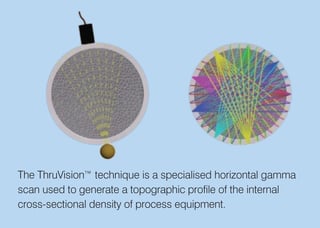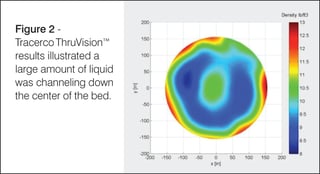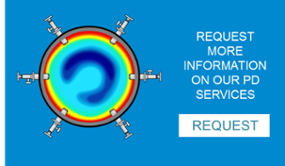This post is the second part of the "Diagnosing liquid maldistribution inside packed beds" series.
In the previous blog, we explained how Tracerco’s Tru-Grid™ Scan technologies can be used to diagnose suspected maldistribution in packed beds. In Part 2, we will discuss how we obtain more details on distribution within the packed bed.
A challenge to process engineers is diagnosing liquid maldistribution problems inside packed beds that can cause severe mass transfer efficiency loss. In industrial distillation columns, common examples of the cause of liquid maldistribution are design, manufacture or installation defects of distributors as well as damage, plugging and process disturbance of packed beds.
In this latest blog we will explain how following a Tru-Grid™ Scan, Tracerco’s ThruVision™ technology was able to obtain a more detailed liquid distribution profile of the packed bed.
Once Tru-Grid™ Scan results have determined the liquid distribution in a packed column and more quantitative information about liquid distribution is required or if there is reasonable suspicion that the bed is experiencing annular liquid maldistribution then a ThruVision™ scan is recommended.
ThruVision™ is a specialised horizontal gamma scan used to generate a topographic profile of the internal cross-sectional density of process equipment. This profile is useful for the detailed study of liquid flow distribution through packed columns as well as having applications beyond distillation columns.

The project field test in the previous blog post referenced a tower that was unusually unstable. The customer could not increase the feed to design rates while maintaining desired product quality. Both the overhead and bottoms products were off specification, even when the tower was running at reduced rates.
Following a Tru-Grid™ Scan of the tower, the results showed that all distributors, collectors, and packed beds were in place with no evidence of mechanical damage. The Tru-Grid™ Scan also showed slight liquid maldistribution in all of the beds, but not severe enough to cause the very poor tower efficiency. It was suspected that liquid maldistribution was an issue and therefore, plant personnel wanted to get complete picture of the distribution pattern. In order to obtain a more detailed liquid distribution profile, a ThruVision™ Scan was performed.
The ThruVision™ Scan results (Figure 2) shows that a large amount of liquid was channelling down through the centre of the bed. This was not detected by a Tru-Grid™ Scan due to its pattern as all scan chords showed similar density profiles. This confirmed that liquid maldistribution, rather than poor packing performance, was the cause of reduced tower efficiency.

This study provided plant personnel with the information to enable them to make the right decision to shut down the tower and inspect the liquid distributors. Upon inspection, plant personnel discovered an error in distributor installation. This error was causing a large portion of the liquid to channel down the centre of the packing. The problem was corrected and the tower was restarted without incident. Following start-up, the tower was pushed to maximum design rates, and the desired separation efficiency of the new packing was achieved.
Tracerco’s technology confirmed the position and operating condition of the packed bed allowing plant personnel to prepare the equipment and field services to make the necessary repairs in advance of the shutdown; minimising downtime, emergency expenditures and lost production.
If you want to learn more about how Tracerco’s technologies enable you to make the right decision, request more information.
Read the full series:
Part 1 – How to diagnose liquid maldistribution in packed beds: A case study - Part 1
Part 2 – How to diagnose liquid maldistribution in packed beds: A case study - Part 2
